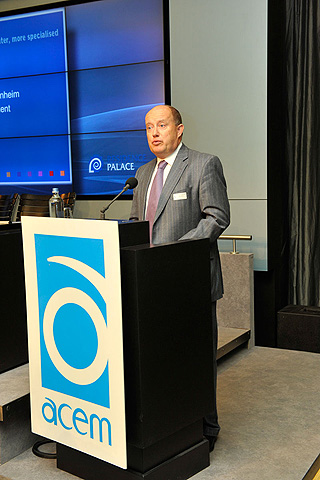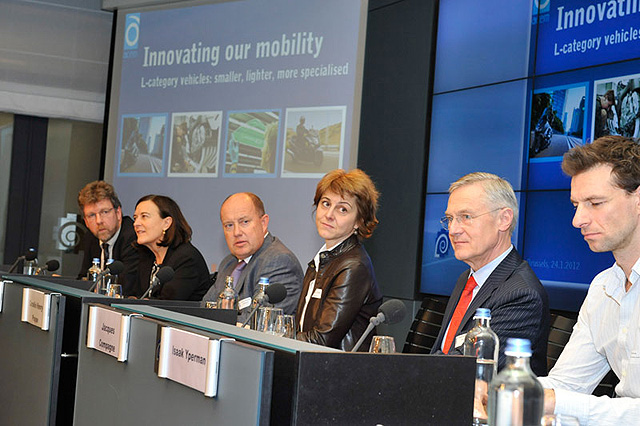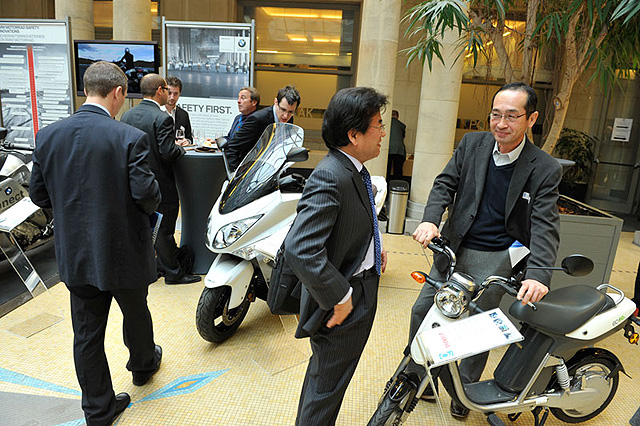ACEM's 8th Conference Focuses on
2012/03/22 | By Quincy LiangThe European Union’s (EU) powered two-wheeler (PTW) market in 2011 saw the worst performance of the decade, with new-PTW registrations falling by another 9.5%, or about 170,000 units, to only 1.7 million units sold, according to statistics released by the ACEM (Association of Motorcycle Manufacturers in Europe).

At the yearly industry meeting held late January 2012 in Brussels, ACEM's president Hendrik von Kuenheim had grim news to share with the participants of the 8th annual conference, that the motorcycle industry in Europe is undergoing unprecedented recession due to the current economic crisis.
The year 2011 saw the worst PTW sales in a decade with only 1.7 million registrations; while the peak year of 2007 saw 2.7 million units sold, with the decline in 2011 being 9% year-on-year. The whole sector is suffering with many suppliers and dealerships facing bankruptcy, resulting in loss of jobs as well as disruption of supply chains to delay production and rack up costs, says Kuenheim.
In the context of the new EU rules on motorcycle type-approval, Kuenheim called on policy-makers to adopt simple and pragmatic solutions aimed at achieving a stable, predictable and feasible environment for manufacturers. Referring to the recently adopted White Paper on Transport which encourages using smaller and more efficient vehicles, Kuenheim said that PTWs perfectly meet such requirements.
Difficulties
Suppliers going bankrupt means abrupt stop of supplies to OEMs who have to find replacement suppliers, re-invest in new tooling to restart production, which forces mobilizing resources to generate significant added cost, disrupt production on top of losing sales, says Kuenheim.
Amid these conditions, better regulation such as ensuring a reliable and favorable regulatory framework, based on overall assessment of economic and social impact, is of utmost importance, in particular for smaller companies that make up the majority of the industry. “A new EU type-approval framework for our sector is currently under discussion in Brussels – I can only stress again the absolute need for the industry to have a stable, predictable and especially a feasible regulatory environment to underpin our long-term investment strategies. There is no time for idealistic approaches - simple pragmatic solutions must be prioritized,” he adds.

According to Kuenheim, the PTW industry in Europe has a long tradition in providing mobility solutions meeting this policy objective – ACEM manufacturers in particular have shown ability to innovate, with motorcycles, scooters, tricycles, and quadricycles which achieve a new mobility paradigm not only to city streets but also to sport, leisure and tourism activities.
An ideal solution for urban environments is ‘electromobility.’ It is becoming reality in some segments of our production due to specialized use and lightweight products, with vehicles already on the market, others close to launch and more in the pipeline. Whilst the electric vehicle segment remains small at 15,000 units sold in 2011, it has been doubling year-on-year, albeit a niche at less than 1% of the market. ‘Range anxiety’ and cost still prevent the higher popularization of electric mobility,” says Kuenheim.
Cleaner, Enhanced Safety & New Architecture
Cleaner engines, enhanced safety systems and a shift toward new architecture are the main trends identified by Jacques Compagne, General Secretary of ACEM, which will characterize the future lineup of L-category vehicles, such as mopeds, motorcycles, tricycles and quadricycles.
While PTWs contribute minimally to overall traffic emissions, less than 2% of CO2, the ACEM says that manufacturers are nevertheless committed to reducing their environmental impact. Hybrid, electric and fuel cell are likely to gain more market share in the future.

To reinforce the main message of the conference—Innovating our Mobility—makers displayed vehicles with innovative emission and safety features, including electric vehicles as the KTM Freeride, the Peugeot e-Vivacity, and fully electric scooters from Honda and Piaggio; while Suzuki showcased for the first time in Brussels its type-approved Burgman fuel-cell scooter.
Presentations
The conference included two presentations giving the full picture of the potential of PTWs for future mobility.
Isaak Yperman, a researcher of Transport and Mobility Leuven, presented a recent study on commuting by motorcycle between Brussels and the nearby city of Leuven. The study, based on a simulation, concluded that if only 10% of commuters switched from cars to motorcycles or scooters, the overall congestion will be reduced by 40%, with the benefits being not only significant time saving but also reduced environmental impact.
Coralie Henry-Poppe from PSA Peugeot Citroen presented “MU by Peugeot,” a tailored mobility service designed as the right mode of transport for each specific need, with PTWs as an integral part of the range of vehicles available for consumers.
Sylvain Haon, General Secretary of Polis, moderated the panel discussion which was joined by Spanish Member of the European Parliament Inés Ayala Sender and Paul Verhoef, Head of Unit Research and Innovative Transport Systems of the European Commission.
Ayala Sender acknowledged the potential of PTWs to reduce congestion and called for a stronger integration of PTWs. For the first time users and organizations were invited to participate in the ACEM Conference to air their views. The Federation of International Motorcycling (FIM) and Federation of European Motorcyclists' Associations (FEMA) promoted motorcycles with perspectives on sustainable sports, mobility and the environment.

